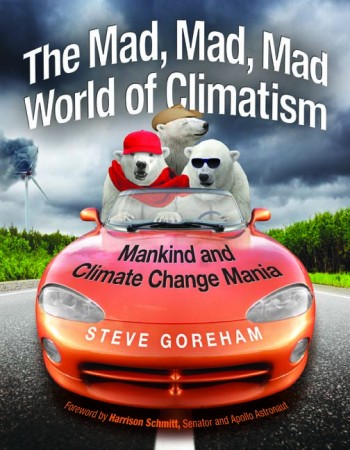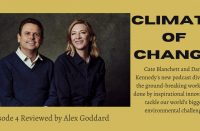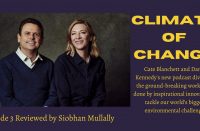For a spot to sit down and read The Mad, Mad, Mad World of Climatism, I chose my bathroom. This isn’t because I was convinced Steve Goreham had produced a scatological text – I hadn’t read it yet, after all – but because the book had been laid out as a straightforward read that can be tackled one sitting at a time, like other bathroom books you’ve probably encountered in loos everywhere (How to Shit in the Woods, Stuff White People Like, The Guinness Book of World Records and so on).
For a spot to sit down and read The Mad, Mad, Mad World of Climatism, I chose my bathroom. This isn’t because I was convinced Steve Goreham had produced a scatological text – I hadn’t read it yet, after all – but because the book had been laid out as a straightforward read that can be tackled one sitting at a time, like other bathroom books you’ve probably encountered in loos everywhere (How to Shit in the Woods, Stuff White People Like, The Guinness Book of World Records and so on). This book is organized in digestible bits and bites: there are lots of cartoons and whimsical sidebars, and information is presented in short, easy-to-read sections. It is claimed to be “the first climate change book that is fun to read!” But this is far from the only inaccurate claim Goreham makes in his book.
Right-wing conservatives who don’t fall in line with the judgment of the overwhelming majority of climate scientists are likely to find The Mad, Mad, Mad World of Climatism to be a jolly good read that reinforces their views, but it quickly became clear to me that this book is both sad and ridiculous, if not downright dangerous. Mad, Mad, Mad World is Goreham’s second offering on climate change and the latest text in a growing library of disingenuous treatises written to convince the public that “climate change is natural and cars are innocent.”
Goreham is the most dangerous of all combinations: an engineer with a MBA. He is executive director of the Climate Science Coalition of America (CSCA), an offshoot of the International Climate Science Coalition. Both organizations have ties to the Heartland Institute, a right-wing, neo-liberal think tank bent on “discover[ing] and promot[ing] free-market solutions to social and economic problems.” It is an agenda that includes insidiously debunking climate science and other research that could lead to further regulation of the economy.
The prominent science journal Nature had this to say about the Heartland Institute: “Despite criticizing climate scientists for being overconfident about their data, models and theories, the Heartland Institute proclaims a conspicuous confidence in single studies and grand interpretations,” and “makes many bold assertions that are often questionable or misleading.” Like other climate skeptics, the Heartland Institute seems “to review scientific data and studies not as scientists but as attorneys, magnifying doubts and treating incomplete explanations as falsehoods rather than signs of progress towards the truth. … The Heartland Institute and its ilk are not trying to build a theory of anything. They have set the bar much lower, and are happy muddying the waters.”
Nature’s assessment of the Heartland Institute also neatly sums up the absurd arguments put forth in Goreham’s book. A comprehensive response to all his nonsensical claims and counterclaims would only serve the interests of Goreham’s community of climate change liars – they have gone beyond denial at this point. Thankfully, there are already a large number of books by real climate scientists who set the record straight on such claims.
Goreham’s real agenda is shared with most climate change skeptics. It has nothing to do with science, and everything to do with politics. Mad, Mad, Mad World’s most telling sentence details it concisely. In the book’s foreword, astronaut Harrison Schmidt asserts that “today’s Americans have an obligation to future Americans to elect leaders who do not believe in an omnipotent government but believe, as did the Founders, in limited government, and in the preservation of liberty and the natural rights of people.”
This belief in limited government has played a powerful role in shaping the world we live in; its reach extends far beyond climate change. In their powerful book, Merchants of Doubt: How a Handful of Scientists Obscured the Truth on Issues from Tobacco Smoke to Global Warming, science historians Naomi Oreskes and Erik Conway detail the scope of this agenda. Not unlike the Catholic church’s abhorrence of heliocentrism – which, in the 16th century, contradicted the fundamental theological belief that the Earth and its God-created human inhabitants existed at the center of the universe – Oreskes and Conway make a compelling case that the climate denial movement isn’t really about climate change per se. They say it’s about a fundamentalist belief in the sanctity of a free-market economy with few (and preferably no) regulations.
Oreskes and Conway show how eminent Cold War scientists – many of them cited by Goreham in Mad, Mad, Mad World – participated in the Great Denial Movement of which climate change is but a part. The powerful story begins with Big Tobacco’s disreputable and self-serving tactics to “manufacture doubt” about the link between smoking and cancer, and moves on to nuclear winter, missile defence, acid rain and the ozone layer. At the heart of all of these debates is a cadre of right-wing scientists – as well as pseudo-scientists like Goreham – who work through organizations like the Heartland Institute to create enough doubt in the court of public opinion to forestall regulations that would hurt mega-industries like the tobacco and fossil fuel energy sectors.
Even Canada’s current Prime Minister can be seen as complicit in this project. While a member of the official opposition in 2002, Stephen Harper wrote a letter that could have been drawn directly from the contents of Mad, Mad, Mad World. According to Harper, anthropogenic climate change was based on “tentative and contradictory scientific evidence,” he wrote, while dismissing the possibility of carbon dioxide being problematic simply because it is “essential to life,” and calling the Kyoto Accord a “socialist scheme to suck money out of wealth-producing nations.”
Those of us who accept the veracity of anthropogenic climate change may simply roll our eyes and snigger when we hear such nonsense, but the implications of the misinformation are potentially disastrous. Goreham, Harper and their ilk do what they do because it works. The lack of any meaningful climate policy in Canada or the United States attests to this. Voters are left with the troubling question of why we let such deceitful ideologues get away with promulgating the vile river of little black lies that leaves the public ill-equipped to make tough decisions about the future of our consumptive and unsustainable capitalist democracies.
The reality is that most of us don’t really want to know the truth, according to social psychologist Kari Marie Norgaard. In Living in Denial: Climate Change, Emotions, and Everyday Life, Norgaard investigates how denial, operating as a social process, hinders our ability to take effective action on climate change despite the increasingly visible signs. Extreme weather events, acidifying oceans, droughts and wildfires – these are all clear indications that right-wing ideologues would have us ignore. Because of our tendency to believe what we want to hear and/or throw our hands up in despair or confusion, most of us are only too happy to oblige.
Norgaard spent 12 months between 2000 and 2001 conducting interviews and observing social dynamics in a rural Norwegian community where the public openly linked unusual weather patterns to the onset of global warming. Flooding came to Oslo in November of that year and winter snows came so late that the local ski hill didn’t open until December. For the first time in the ski hill’s history, its snow was 100 per cent artificial. Norgaard found that people were concerned about the weather abnormalities and worried climate change was to blame. Yet the topic was almost invisible in public and political discourse.
We don’t really want to know about the causes and implications of the climate change we are causing. It makes us too uncomfortable, and we feel there is little we can do to change it anyway. Instead, even as the local lake refused to freeze that winter in rural Norway, Norgaard writes that “community members collectively held information about global warming at arm’s length by participating in cultural norms, and by using a series of interpretive narratives to deflect disturbing information and normalize a particular version of reality in which ‘everything was fine.’ As such, public nonresponse to global warming was produced though practices of everyday life.”
If any of this sounds eerily familiar, it’s because in Canada and the United States, the invisible power of denial is all around us. Although climate change is discussed in the media and among key stakeholders, few of us have changed our lifestyles or taken time out of our busy schedules to force our political representatives to take it seriously. We simply wander around in a quiet fantasy world created in part by ourselves, and in part by the likes of Goreham, who have provided us with an imaginative, if ultimately destructive, psychological life raft. This allows us to elect a climate-denying prime minister and accept, if only grudgingly, that tar sands oil will be the foundation of our economy for the next century, all the while ignoring the visible scars of a warming world.
The Mad, Mad, Mad World of Climatism: Mankind and Climate Change Mania, Steve Goreham, New Lenox, Illinois: New Lenox Books, 2012, 312 pages
Merchants of Doubt: How a Handful of Scientists Obscured the Truth on Issues from Tobacco Smoke to Global Warming, Naomi Oreskes and Erik W. Conway, New York: Bloomsbury, 2012, 368 pages
Living in Denial: Climate Change, Emotions, and Everyday Life, Kari Marie Norgaard, Cambridge, Mass: The MIT Press, 2011, 304 pages.
This review originally appeared in Art & Media, issue 39.3. Subscribe now to get more book reviews in your mailbox!
Reviewer Information
Jeff Gailus is an award-winning writer and author of The Grizzly Manifesto and Little Black Lies: Corporate and Political Spin in the Global War for Oil.












